The Golden Age of Science Fiction: The 1973 John W. Campbell Memorial Award: Beyond Apollo, by Barry N. Malzberg (plus Special Award to Robert Silverberg for Dying Inside)
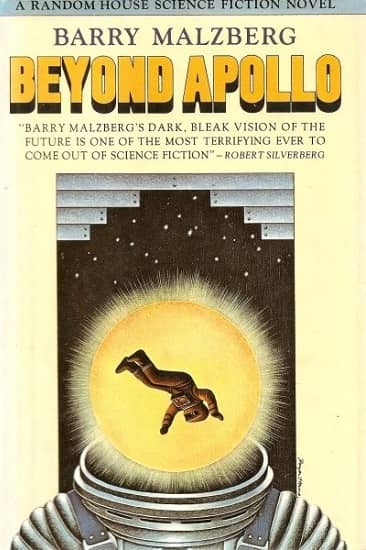 |
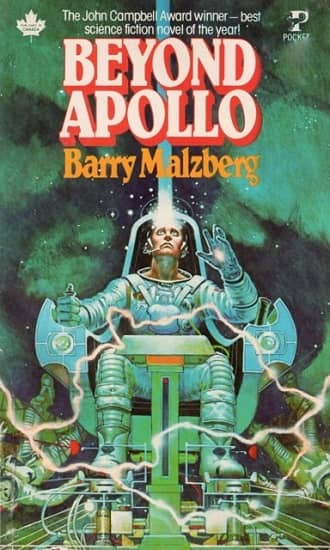 |
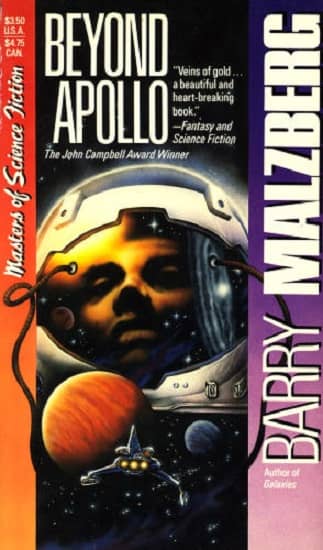 |
Beyond Apollo (Random House, 1972, Pocket Books, 1979, Carrol & Graf, 1989). Covers by Roger Hane, Don Maitz, and unknown
Two separate awards were established in 1973 in memory of the profoundly influential long time editor of Astounding/Analog, John W. Campbell, Jr., who had died in 1971. We have already covered the John W. Campbell Award for Best New Writer (which has just been renamed the Astounding Award), which went to Jerry Pournelle.
The John W. Campbell Memorial Award is given for the Best Science Fiction Novel of the year. It is a juried award. It was first established by Harry Harrison and Brian W. Aldiss, to, well, let’s reproduce Harrison’s words:
When John died it was a blow to all of us. After the memorial service a number of his writers were talking, and out of the talk came the Astounding anthology, what has been called the last issue of the Campbell magazine. It was a good tribute to a good editor. There is another tribute I think of just as highly, the award for the best SF novel of the year presented in his name and memory. An award I am sure he would have loved because it instantly became involved in controversy when the first prizes was presented. How John enjoyed a good argument and a good fight! That this fight sprawled through the letter columns of Analog for some months would have cheered him even more.
The first award was presented at the Illinois Institute of Technology in Chicago. The jury for the first award consisted of Harrison, Aldiss, Thomas Clareson, Willis McNelly, and Leon Stover.
[Click the images for Golden Age-sized versions.]
For the next few years the award presentation moved around, until it settled at the University of Kansas in 1979. The award became administered by the Gunn Center for the Study of Science Fiction at KU, along with the Theodore Sturgeon Memorial Award for Best Science Fiction Short Story, established later. The current jury includes Christopher McKitterick, Gregory Benford, Sheila Finch, Lisa Yaszek, Elizabeth Anne Hull, and Pamela Sargent.
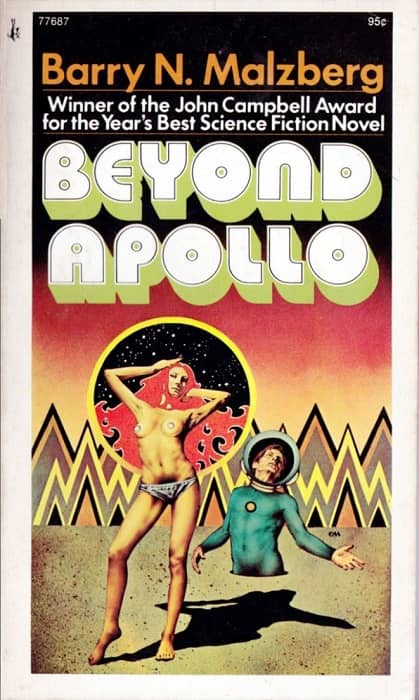 |
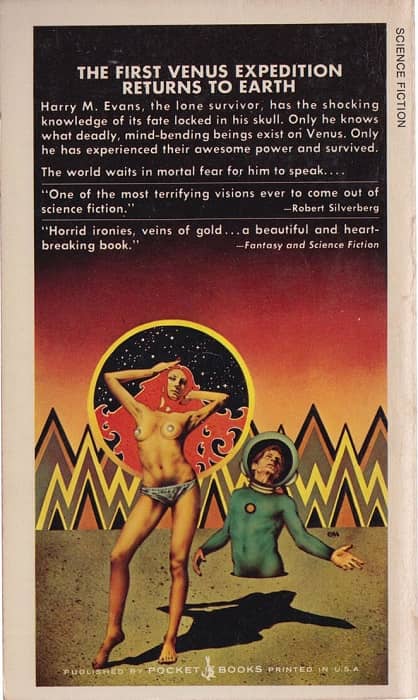 |
Beyond Apollo (Pocket Books, 1973). Cover by Charles Moll
In 1973 the jurors chose Barry N. Malzberg’s Beyond Apollo to be the first winner of the Campbell Memorial Award. Like many of Malzberg’s works, this is a metafictional novel, presented as Harry Evans’ account of the disastrous first expedition to Venus, of which he was the only survivor. But instead of a straightforward factual account, this is a fictionalized version, indeed, a novel, and by the end we learn that it has been accepted for publication (and we are reading the result.) The novel does not present a consistent telling of Evans’ expedition, and it seems possible that Evans is in fact insane. I read it back in 1974 or so, along with a great many of Malzberg’s slim volumes. I found Malzberg’s narrative voice (fairly similar across most of his books) to be continually fascinating, almost hypnotic in its effect, and I enjoyed many of his books, this being one of his best.
As Harry Harrison’s paragraph quoted above suggests, this award was very controversial. It was felt by many that Beyond Apollo was not at all the sort of book Campbell would have published (which I think is almost undoubtedly true.) Its rather cynical message, portraying a space mission that failed (apparently) in part because of the neuroses of its members, was seen to be the opposite of Campbell’s technophilic vision. And the metafictional nature of the telling, and the ambiguous reality of the events portrayed, raised questions as to whether it was even really SF.
Be that as it may, I feel that Beyond Apollo is a successful use of SFnal tropes to explore the ideas behind much SF, and behind our urge to explore the universe, and I don’t think the award inappropriate at all. Indeed, this award established for the Campbell Memorial Award a reputation for recognizing works slightly outside the mainstream of the SF world – excellent works, mind you, and truly science fiction, but often novels that were missed by the standard awards. A first-rate recent example of this is the 2016 award to Eleanor Lerman’s Radiomen, but almost any Campbell Memorial Winner in the past decade, and many in the decades prior, illustrates this notion.
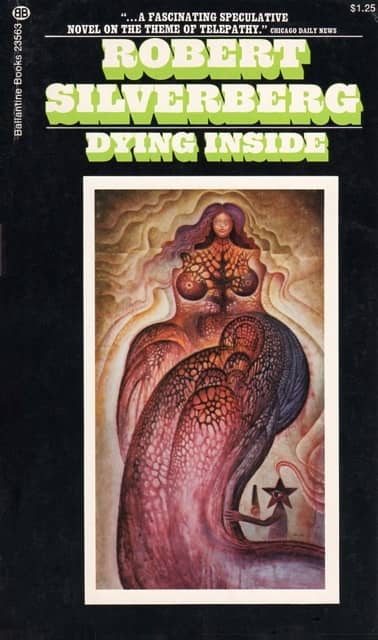 |
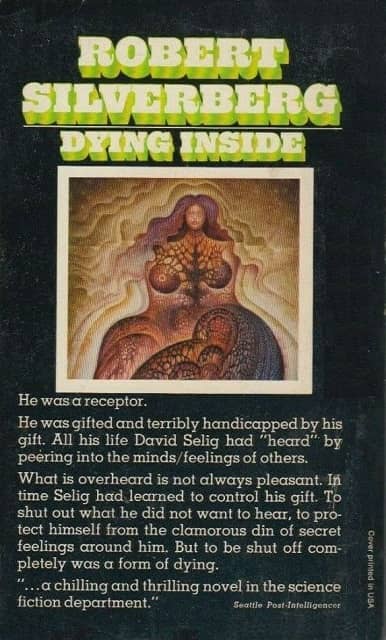 |
Dying Inside (Ballantine Books, 1973, cover by Phil Kirkland)
In a way, the first jury almost invited controversy with their award process, for they chose to also give a Special Award, for “Excellence in Writing,” to Robert Silverberg’s novel Dying Inside. This is an exceptional novel, one of Silverberg’s best. I read it in the mid-70s, and didn’t really get it, but I reread it fairly recently, and was quite impressed. It’s the story of David Selig, a telepath who has really got very little benefit from his special power. He makes a living, not much of one, by writing term papers for local students. (The book is set in 1970s New York.) Then he begins to lose his telepathic ability. It’s an SF novel fundamentally based on exploration of character, and it does so very well.
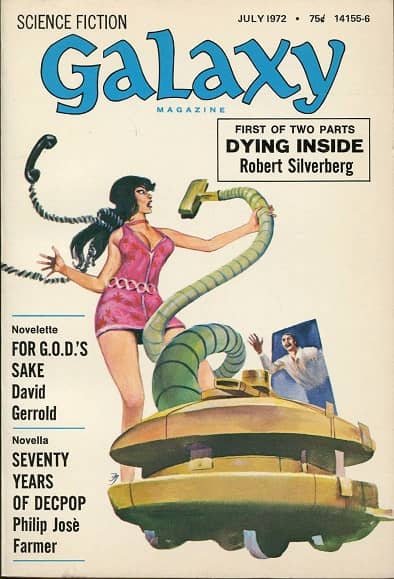 |
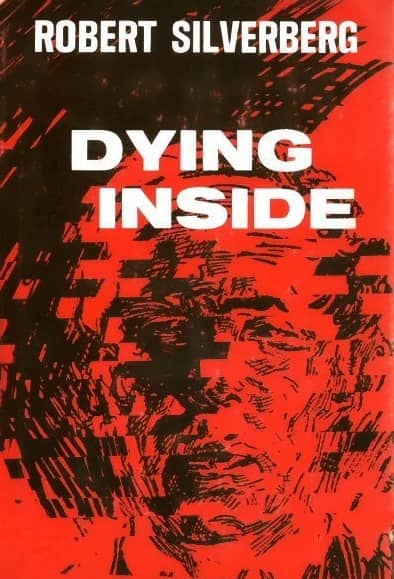 |
Galaxy Magazine, July-August 1972, with the first installment of Dying Inside (Cover by Gaughan),
and the first edition hardcover from Charles Scribner’s Sons (1972, cover by Jerry Thorp)
The Campbell Memorial jury usually also cites second and third place “winners.” In 1973 those were James Gunn’s The Listeners (a very well-done novel about, in essence, SETI), and Christopher Priest’s Fugue for a Darkening Island (about a near future England falling into chaos, a chaos partially echoed by the fragmented nature of the book’s structure.)
Rich Horton’s last article for us was The 1973 Hugo and Nebula Awards for Best Novel: The Gods Themselves by Isaac Asimov. His website is Strange at Ecbatan. See all of Rich’s articles here.
Of the two novels awarded a Campbell Memorial, I find Beyond Apollo more science-fiction-y. Or at least more congenial to a sf reader. Dying Inside often has a blurb from the NY Times: “Science fiction for people who don’t like science fiction”, and I tend to find that quote unintentionally pinpointing my unease with Silverberg’s novel as having a very anti-sf affect. Selig’s loss of telepathy is coupled to his loss of childhood/ability to “grow up”, much like a sf reader giving up genre literature for “real” books.
Reading a Malzberg novel is like sucking a lemon. The thing is, you can get to where you like it. I certainly did!
Eugene — I see your point, and in a way the first Campbell Memorial Awards honored 2 (3, if you add the Priest novel) decided non-Campbellian novels. (That said, Silverberg did write a great deal for Campbell early in his career.)
Thomas — that’s a nice way to put it! I definitely came to where I liked it, too!